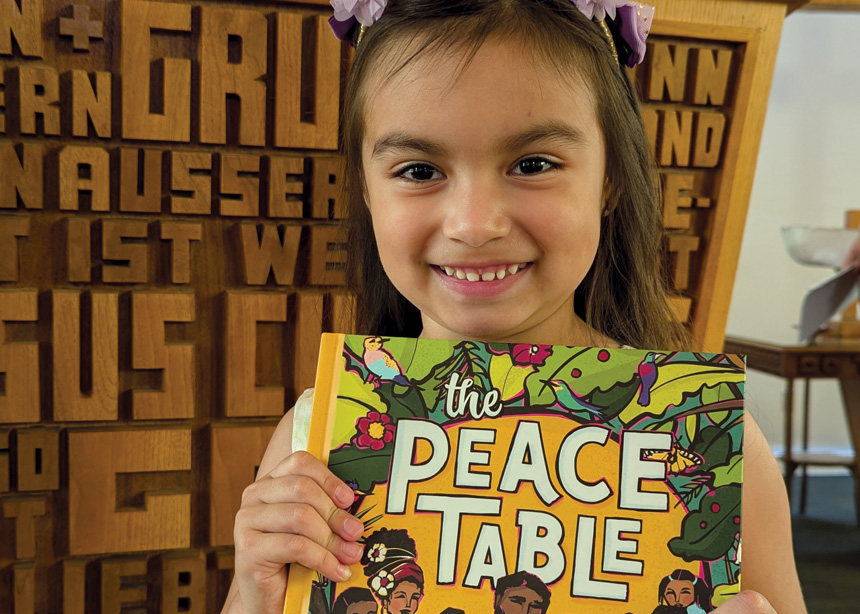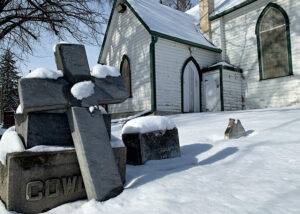Joan Daggett, project director of MennoMedia’s Shine: Living in God’s Light curriculum, tracks trends in
Christian education as part of her work. We asked her about the challenges and opportunities for faith formation of children in 2024.
Over the past number of years, church attendance patterns across North America began shifting away from the model of regular weekly attendance. When it came to Sunday school, that resulted in children missing a Sunday or two a month. In turn, this meant teachers had to help children catch up on material they missed. The need to help teachers address this challenge with flexible curriculum was already on the radar of MennoMedia’s curriculum developers.
Then the pandemic hit. Since then, according to Daggett, “It’s been a struggle for churches.” The resulting drop in curriculum sales has now rebounded to near pre-pandemic levels, but that doesn’t mean a return to normal in the world of Sunday school and curriculum.
Attendance continues to be more sporadic than ever. Shine addresses this with resources such as “follow the story” cards that offer continuity and sequence of curriculum for elementary-aged children.
Another change and challenge is an increased desire among parents to take the lead in the faith formation of their children. Daggett points to a multi-country survey of children’s ministry in June 2021 in which 97 percent of respondents indicated that “the Church should not be the primary lead in faith nurture of children, but rather their role was to support parents, reinforce parental nurture and be available for advice
if needed.” This reflects the experience of families during the height of the pandemic, when parents, as Daggett says, “were their children’s teacher … when their churches were not able to do that.”
This new mode of parental role in children’s faith formation also bears out research that says that parents are the most influential factor in the faith formation of children.
Further, a 2019 American study conducted by the Barna group found that church leaders of all denominations universally agreed that children’s spiritual
formation should start with parents.
For Daggett, this is good news as it reverses the former trend in which parents sometimes assumed the church would take on this responsibility.
There is, however, a disconnection between parents and churches when it comes to expectations of the other, according to a report done by the Lilly Endowment’s Christian Parenting and Caregiving Initiative. Parents express a desire for genuine and collaborative partnership rather than the church acting as the expert, but churches place little emphasis on training and equipping parents.
According to a Scripture Union Canada survey, while 55 percent of churches provide resources to help
families pray and engage with the Bible, these efforts have limited success. Survey respondents observed that, “Parents have to be involved and equipped. It’s not enough to give them a resource and expect them to form their kid’s spirituality.”
The Christian Parenting and Caregiving Initiative was launched to provide funding to bridge the gap
between parents and the church. In 2023, MennoMedia received a grant of US$1.25 million from the Lilly
Endowment to develop a program called Shine Everywhere, which began to be released in February 2024. Its purpose, Daggett says, is to “try to help churches think about how they build better relationships with their families and how they partner with them more.”
Another resource developed by MennoMedia is The Peace Table Bible released in 2023. It offers pathways to peace with God, creation, others and oneself. A wide range of churches report using The Peace Table as a framework for worship and learning as well as during children’s story time.
“We want to equip churches and families to help their children [grow in faith],” says Daggett. “That seems to be very appealing not only to Me nonites and Brethren but also people outside as well.” Shine resources are used by many Mennonite and Brethren churches as well as churches in 17 other denominations.
Other resources for children’s faith formation
- What parents can do to increase the chances of raising children who will believe
and practice some version of their faith.
firstthings.com/article/2021/05/keeping-the-faith - How parents who aren’t sure what they believe can create spiritual practices for
their kids.
almostheretical.com/teaching-your-kids-while-deconstructing-christianity - An approach to church for families, especially for those not part of a church.
messychurch.ca








Leave a Reply
You must be logged in to post a comment.